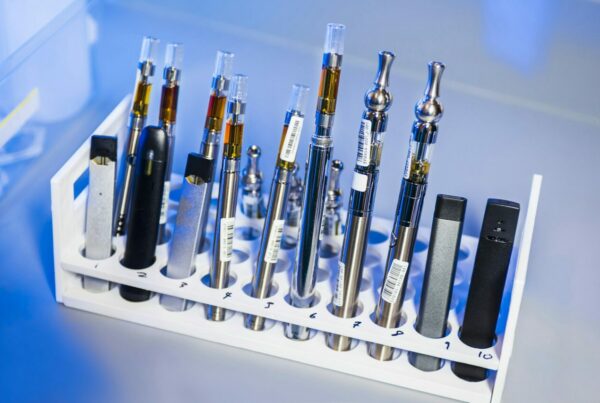N, N-Dimethyltryptamine (DMT) is a substance commonly found in various plants and animals, known for its strong yet short-lived psychedelic effects when ingested.
Mounting evidence suggests that DMT, found naturally in the body, plays crucial roles in the peripheral and central nervous systems, possibly acting as a neurotransmitter.
While DMT can trigger powerful psychedelic experiences, it typically does not cause many unfavorable effects, except possible cardiovascular problems when taken in large amounts through injection.
Let’s explore DMT and its diverse roles, from recreational use to its promising possibilities in scientific studies and therapeutic uses.

DMT at a Glance: What is it?
| Aspect | Details |
| Name | N, N-Dimethyltryptamine (DMT) |
| Classification | Indole alkaloid |
| Occurrence | Occurs naturally in various plants and animals |
| Psychoactive Effects | Induces brief, potent psychedelic experiences upon ingestion. |
| Method of Consumption | Can be smoked, injected, or consumed orally. |
| Duration of Effects | Effects are of short duration, typically lasting from 5 to 30 minutes. |
| Chemical Structure | Comprises a tryptamine core with two methyl groups attached to the nitrogen atom of the amine. |
| Metabolism | Rapidly metabolized by the body, degraded by monoamine oxidase (MAO). |
| Cultural Use | Historically used in various ceremonial and shamanic rituals by indigenous cultures. |
| Other names | Dimitrifantasiabusinessman’s tripBusinessman’s special45-minute psychosisspiritual molecule |
The Role of DMT in Mental Health
N, N-Dimethyltryptamine (DMT), a substance famous for its potent psychedelic effects, is garnering attention for its prospective benefits to mental health. Despite its typical association with intense hallucinatory experiences, recent research suggests a connection between DMT and mental wellness.
Effects on Psychological and Emotional Well-being
DMT’s psychedelic effects are renowned for eliciting intense emotional reactions and altering states of consciousness. These effects could potentially pave the way for therapeutic methods to address mental health concerns, aid emotional processing, and offer new perspectives on personal traumas.
Neuroplasticity and Brain Function
Research suggests that DMT could influence neuroplasticity, thus enhancing the brain’s ability to adapt and reorganize. Studying its impact on synaptic plasticity and neural connectivity could provide potential treatment options for ailments associated with neural irregularities.
Potential Therapeutic Use for Mental Health Disorders
Early-stage research underscores DMT’s potential in treating conditions such as depression, addiction, and PTSD. Its ability to stimulate mystical or spiritual experiences may offer a distinctive psychotherapeutic approach and aid in altering negative thought cycles.
The investigation into the natural presence of DMT within the body suggests its significance in mental health resilience, stress management, and overall psychological well-being. Understanding how the body controls internal DMT levels could establish a foundation for new therapeutic strategies.
DMT and Mental Health Disorders
| Mental Health Disorder | Definition | DMT’s Effectiveness | Benefits |
| Depression | A mood disorder characterised by persistent sadness, lack of interest, and decreased motivation | Preliminary studies suggest DMT may alleviate symptoms by stimulating profound emotional experiences. | Its rapid onset and ability to generate transformative experiences could offer innovative therapeutic techniques for reshaping negative thought patterns and enhancing emotional processing |
| Post-Traumatic Stress Disorder (PTSD) | A mental health disorder resulting from traumatic events, causing flashbacks, intense anxiety, and intrusive thoughts | Initial research indicates DMT’s potential in managing symptoms by eliciting spiritual or mystical experiences that may help patients reshape traumatic memories | The potential of DMT to generate altered states of consciousness could assist in facilitating emotional processing and offering a fresh perspective on traumatic experiences |
| Addiction | A complex disorder characterised by compulsive participation in rewarding stimuli despite adverse consequences | Some research suggests DMT’s potential in disrupting addictive patterns and reducing cravings for substances | DMT’s ability to stimulate profound and transformative experiences may help individuals modify their behavioural patterns and address their addictions |
Approaches to Utilizing DMT
DMT, renowned for eliciting short but powerful psychedelic journeys, can be administered in multiple ways. The chosen method often depends on the individual’s desired strength and length of the experience.
Smoking:
DMT, when smoked in a pipe or vaporizer, necessitates precise temperature control to avoid overheating and destroying the compound. The onset of a psychedelic journey is nearly instantaneous when DMT is smoked, typically lasting from 5 to 15 minutes.
Oral Intake:
Oral consumption of DMT leads to slower onset effects that endure considerably longer, often several hours. This happens because DMT breaks down slower when combined with an MAOI.
Injection:
DMT can be directly injected into the bloodstream for quick and potent effects.
This method yields an immediate and robust experience, but it necessitates precise dosing and carries higher risks.
Insufflation (Snorting):
Snorting DMT results in a slower onset of effects compared to smoking but can provide a more prolonged experience.
Sublingual or Buccal Administration:
When absorbed through the oral mucosa, this method provides an alternative to smoking and offers a longer, albeit less potent, journey.
Determining Therapeutic Dosage: N, N-Dimethyltryptamine (DMT)
For smoking, the suggested dosage is between 20 to 40 mg, while for intravenous use, the recommended dosage is 0.2 to 0.4 mg per kg of body weight. These dosage recommendations are primarily intended for clinical research and are particularly important for intravenous administration.
- Higher intravenous doses are associated with intense visuals, temporary loss of control, and a combined state of anxiety and euphoria
- Interestingly, lower doses have demonstrated less desirable effects
- Recreational doses of smoked DMT typically range from 40 to 50 mg, sometimes even spiking up to 100 mg
- Different doses of intravenous DMT (at 7, 14, 18, and 20 mg dosages) related to near-death experiences has shown to create significant and enduring enhancements in mental health.
Availability of DMT
ProductsOsmosis – 4-ACO-DMT Ethereal Essence Tincture
This tincture is claimed to contain 4-Acetoxy-N, N-dimethyltryptamine (4-AcO-DMT), a form of DMT. Tinctures are liquid extracts designed for oral ingestion, and this specific product may offer a unique experience compared to traditional DMT.
Lucid Supply Co. – 5-MeO DMT Vaporizer
This product is a vaporizer that dispenses 5-Methoxy-N, N-dimethyltryptamine (5-MeO-DMT). The active ingredient, 5-MeO-DMT, is known for its potent, transformative, and often brief experiences.
Integral Alchemist – Acacia – 1ml DMT Vape Cartridge
This DMT vape cartridge by Integral Alchemist is pre-filled with N, N-Dimethyltryptamine. It is likely intended for those who prefer a discreet and convenient method of DMT administration.
Deadhead Chemist – 5-Meo-DMT Cartridge
This cartridge contains 5-Methoxy-N, N-dimethyltryptamine (5-MeO-DMT), a compound known for its deep and powerful effects.
Potential mental health benefits may be associated with personal growth, spiritual experiences, or therapeutic applications aimed at improving emotional well-being.
Deadhead Chemist – N, N DMT Cartridge
Another offering from Deadhead Chemist, this cartridge includes the traditional N, N-Dimethyltryptamine. Cartridges provide a straightforward method of DMT consumption, facilitating a more consistent and stable experience.
Concluding Remarks
The application of N, N-Dimethyltryptamine (DMT) in
What is the importance of a supportive environment when using DMT for mental health?
Therapeutic use of DMT is a fascinating yet complex endeavor. The substance’s ability to induce vivid yet ephemeral psychedelic experiences sets the stage for innovative therapeutic approaches.
Preliminary studies point to its potential significance in emotional processing, personal development, and potentially
The profound influence of mental health therapy requires careful contemplation and responsible usage.
For individuals intrigued by responsibly exploring DMT products, reliable outlets like Buy Mushrooms Online Canada Online Dispensary are available to offer advice and a plethora of options.
Frequently Asked Questions:
How do various DMT products differ in their impact on mental health?
For instance, vaporizers might yield immediate effects, whereas tinctures or vape cartridges could provide more controlled and consistent dosages.
Incorporating derivative compounds or 5-MeO-DMT can result in varying degrees of intensity and diverse effects on mental well-being.
These nuanced differences underscore the importance of choosing a DMT product based on individual preferences and mental health goals.
Can DMT facilitate enduring changes in mental health and personal growth?
There are anecdotal accounts suggesting that DMT-induced experiences could have long-term effects on mental well-being and personal development.
Profound or transformative experiences, such as those resembling near-death experiences, are often associated with reports of sustained positive shifts in psychological health and self-improvement.
While these experiences are intense and transient, they frequently prompt introspection, spiritual revelations, and a sense of unity or enlightenment.
Following these experiences, individuals often report a refreshed perspective on life, improved emotional resilience, and an enhanced appreciation for existence.
What is the optimal strategy for using DMT for mental health purposes?
Making educated choices, which includes thorough research and comprehension of the compound’s effects, is vital.
Advice from mental health professionals or seasoned users can provide valuable insights into potential risks and advantages.
Recognizing personal tolerance and psychological readiness is also crucial, as is ensuring a supportive and secure environment for the experience.
How does the impact of DMT compare to other psychedelic therapies such as psilocybin or LSD in the context of mental health treatment?
DMT’s effects, duration, and intensity exhibit distinct differences compared to other psychedelics like psilocybin or LSD. It is notably shorter in duration.
The unique experiences induced by high-intensity, short-acting psychedelics necessitate specialized therapeutic strategies in mental health. These approaches differ significantly from those utilized for longer-lasting psychedelics.
Recommended Additional Reading:





